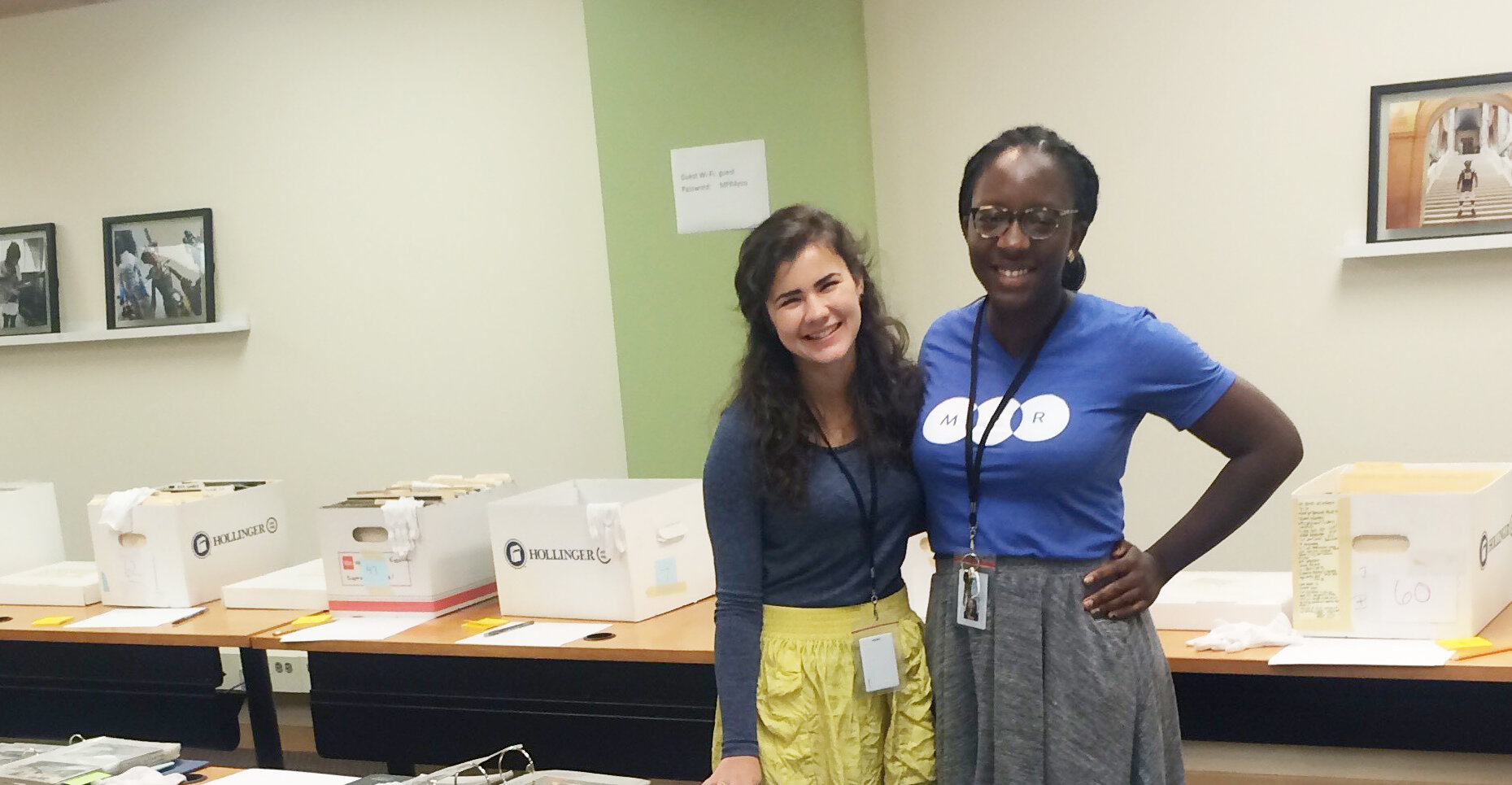Media Relations Contacts
If you are a listener with questions, contact our Audience Services team at 800-228-7123, weekdays 9 a.m. - 4:30 p.m. C.T.
APM | MPR Media Relations
mediarelations@mpr.org (Journalist inquiries, only.)
Media Releases
#MPRlife Inclusion Journey Update: Gender Pronouns and Coffee Breaks
Submitted by Rachel Dennis (she/her) We welcome, talk to and refer to a lot of people around here – in person, on the phone, on air, and in writing. They are our colleagues, candidates, vendors, sources, members, board members and guests, etc. And they don’t all go by “he” or “she.”In the last six months or so, the EQualizers Employee Resource Group has been forming and exploring the question, “How do we create a safer space for folks who are transgender and gender-nonconforming?”On Monday the EQs invited Alex Nelson from RECLAIM! to talk with us about gender identity. We covered terminology, statistics, and building sensitivity through the thoughtful use of language.One of the things about language is that there are folks out there that don’t use pronouns limited to just “he” or “she.” And we’re interacting with them whether we know it or not. One way we can create a safer space for people to be themselves is to mark ourselves as people (and as an organization) who get and respect that. Maybe it’s by offering our pronouns when we introduce ourselves which creates an opportunity for another to do the same, or by removing binary language from things like our employee handbook. For most of us, it’ll take some new language and some new habits, and Alex emphasized the effectiveness of practicing until we get the hang of it. Practice is good.
We welcome, talk to and refer to a lot of people around here – in person, on the phone, on air, and in writing. They are our colleagues, candidates, vendors, sources, members, board members and guests, etc. And they don’t all go by “he” or “she.”In the last six months or so, the EQualizers Employee Resource Group has been forming and exploring the question, “How do we create a safer space for folks who are transgender and gender-nonconforming?”On Monday the EQs invited Alex Nelson from RECLAIM! to talk with us about gender identity. We covered terminology, statistics, and building sensitivity through the thoughtful use of language.One of the things about language is that there are folks out there that don’t use pronouns limited to just “he” or “she.” And we’re interacting with them whether we know it or not. One way we can create a safer space for people to be themselves is to mark ourselves as people (and as an organization) who get and respect that. Maybe it’s by offering our pronouns when we introduce ourselves which creates an opportunity for another to do the same, or by removing binary language from things like our employee handbook. For most of us, it’ll take some new language and some new habits, and Alex emphasized the effectiveness of practicing until we get the hang of it. Practice is good.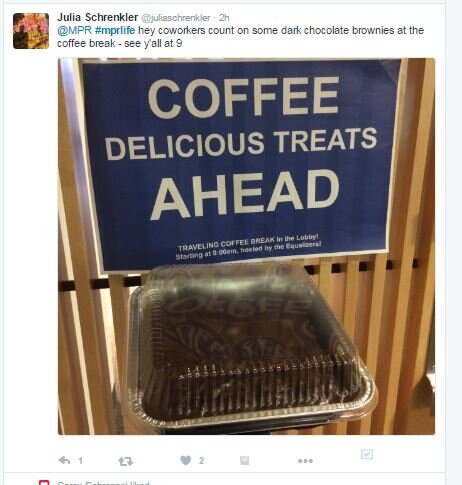 On Wednesday, October 25 the EQs hosted a Traveling Coffee Break* in the lobby at HQ and started practicing with a wider group. Some of us wore nametags that volunteered the pronouns we go by or prompted colleagues to ask us about it. Some of us shared our take-aways from Monday’s training session - like trying to remember the difference between gender orientation, expression, and identity (what you know, what you show, and what you claim). And naturally, some of us focused on the coffee and delicious treats and the chance to be with colleagues away from our desks.*An MPR tradition: various employee groups or departments host coffee breaks on a semi-regular basis. They could be located anywhere in the St. Paul HQ, thus the 'traveling' moniker.
On Wednesday, October 25 the EQs hosted a Traveling Coffee Break* in the lobby at HQ and started practicing with a wider group. Some of us wore nametags that volunteered the pronouns we go by or prompted colleagues to ask us about it. Some of us shared our take-aways from Monday’s training session - like trying to remember the difference between gender orientation, expression, and identity (what you know, what you show, and what you claim). And naturally, some of us focused on the coffee and delicious treats and the chance to be with colleagues away from our desks.*An MPR tradition: various employee groups or departments host coffee breaks on a semi-regular basis. They could be located anywhere in the St. Paul HQ, thus the 'traveling' moniker.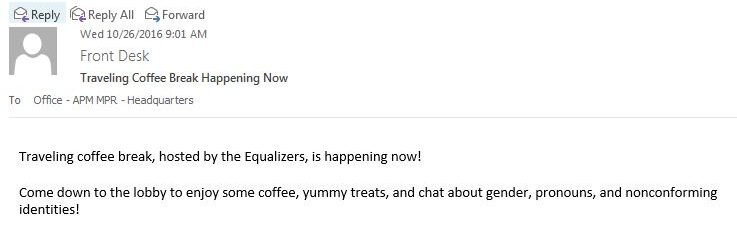
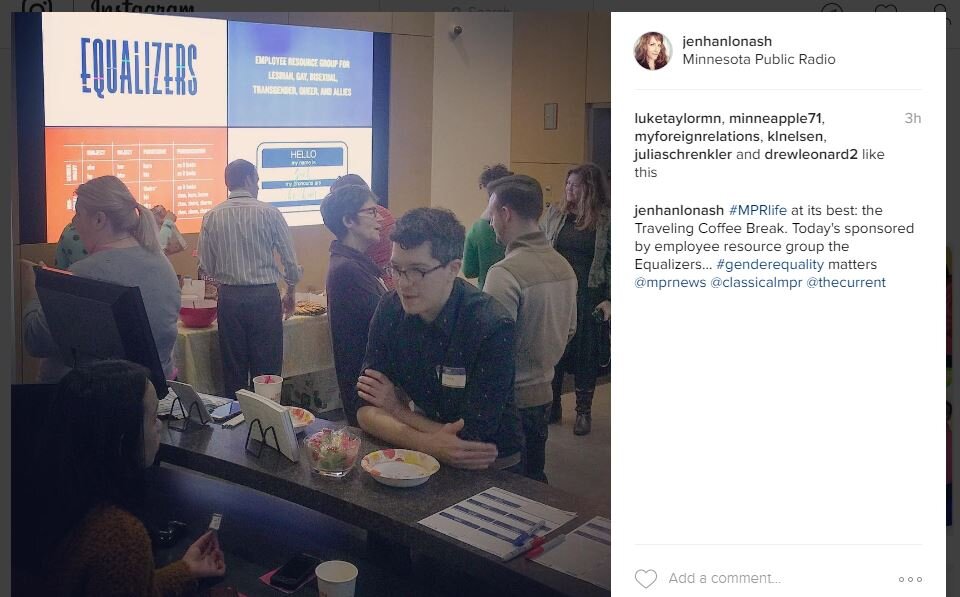
 more from the Inside APMG Blog
more from the Inside APMG Blog
Baking – and raising money – for the future of journalism
Submitted by Marianne Combs, Arts Reporter and Producer, MPR NewsI love a good bake sale – especially when it’s for a cause I can really get behind - and October's bake sale at MPR will go down as one of my all-time favorites. Each year MPR participates in a fundraising campaign for ThreeSixty Journalism, a program run by the University of St. Thomas that teaches ethnically diverse high school students how to tell their stories, and attempts to instill in them a love of journalism. As a media organization that recognizes the importance of a multicultural workforce, we know it’s critical to help foster talent at an early age.Last week our in-house fundraising campaign culminated in a bake sale with contributions from some of the best bakers in the newsroom. Digital Producer Nancy Yang created a “Purple Rain” cake in honor of Prince; reporters Solveig Wastvedt and Peter Cox each whipped up batches of pumpkin muffins and ginger snaps, and editor Meg Martin turned out fudge and biscotti. Even our Executive Director of News and Programming Nancy Cassutt brought in some Rice Krispies treats.
Each year MPR participates in a fundraising campaign for ThreeSixty Journalism, a program run by the University of St. Thomas that teaches ethnically diverse high school students how to tell their stories, and attempts to instill in them a love of journalism. As a media organization that recognizes the importance of a multicultural workforce, we know it’s critical to help foster talent at an early age.Last week our in-house fundraising campaign culminated in a bake sale with contributions from some of the best bakers in the newsroom. Digital Producer Nancy Yang created a “Purple Rain” cake in honor of Prince; reporters Solveig Wastvedt and Peter Cox each whipped up batches of pumpkin muffins and ginger snaps, and editor Meg Martin turned out fudge and biscotti. Even our Executive Director of News and Programming Nancy Cassutt brought in some Rice Krispies treats. And our co-workers responded in kind with amazing generosity. By the end of the day we had raised $4,400 for the ThreeSixty Journalism program. That’s a record for us, and it placed us once again as the top media donor - outgiving the Star Tribune, KARE 11 and several other local media sponsors.There’s another reason this bake sale was particularly important. In past years the fundraising campaign was run by our beloved colleague Toni Randolph, who died last summer. Toni was a mentor to many budding reporters, and a champion for diversity. We felt it was important not just to match what she raised in past years, but to go even further, in her honor.
And our co-workers responded in kind with amazing generosity. By the end of the day we had raised $4,400 for the ThreeSixty Journalism program. That’s a record for us, and it placed us once again as the top media donor - outgiving the Star Tribune, KARE 11 and several other local media sponsors.There’s another reason this bake sale was particularly important. In past years the fundraising campaign was run by our beloved colleague Toni Randolph, who died last summer. Toni was a mentor to many budding reporters, and a champion for diversity. We felt it was important not just to match what she raised in past years, but to go even further, in her honor. So it was particularly gratifying for me last Friday to attend the ThreeSixty Journalism fundraising and awards dinner, where I got to meet some of the amazing high school seniors that benefit from the program. They are smart, enthusiastic, motivated young men and women, and I have no doubt they will go far.I’m already looking forward to next year’s bake sale, and to breaking more records, as we take our commitment to diversity in journalism forward.Toni would be thrilled.
So it was particularly gratifying for me last Friday to attend the ThreeSixty Journalism fundraising and awards dinner, where I got to meet some of the amazing high school seniors that benefit from the program. They are smart, enthusiastic, motivated young men and women, and I have no doubt they will go far.I’m already looking forward to next year’s bake sale, and to breaking more records, as we take our commitment to diversity in journalism forward.Toni would be thrilled. more from the Inside APMG Blog
more from the Inside APMG Blog
Slice of #MPRlife: Pop Up Concert Edition
Sometimes things like this happen when you work at MPR...


 more from the Inside APMG Blog
more from the Inside APMG Blog
Talking the talk: Can the parlance of public media drive inclusivity?
by Eric Garcia McKinley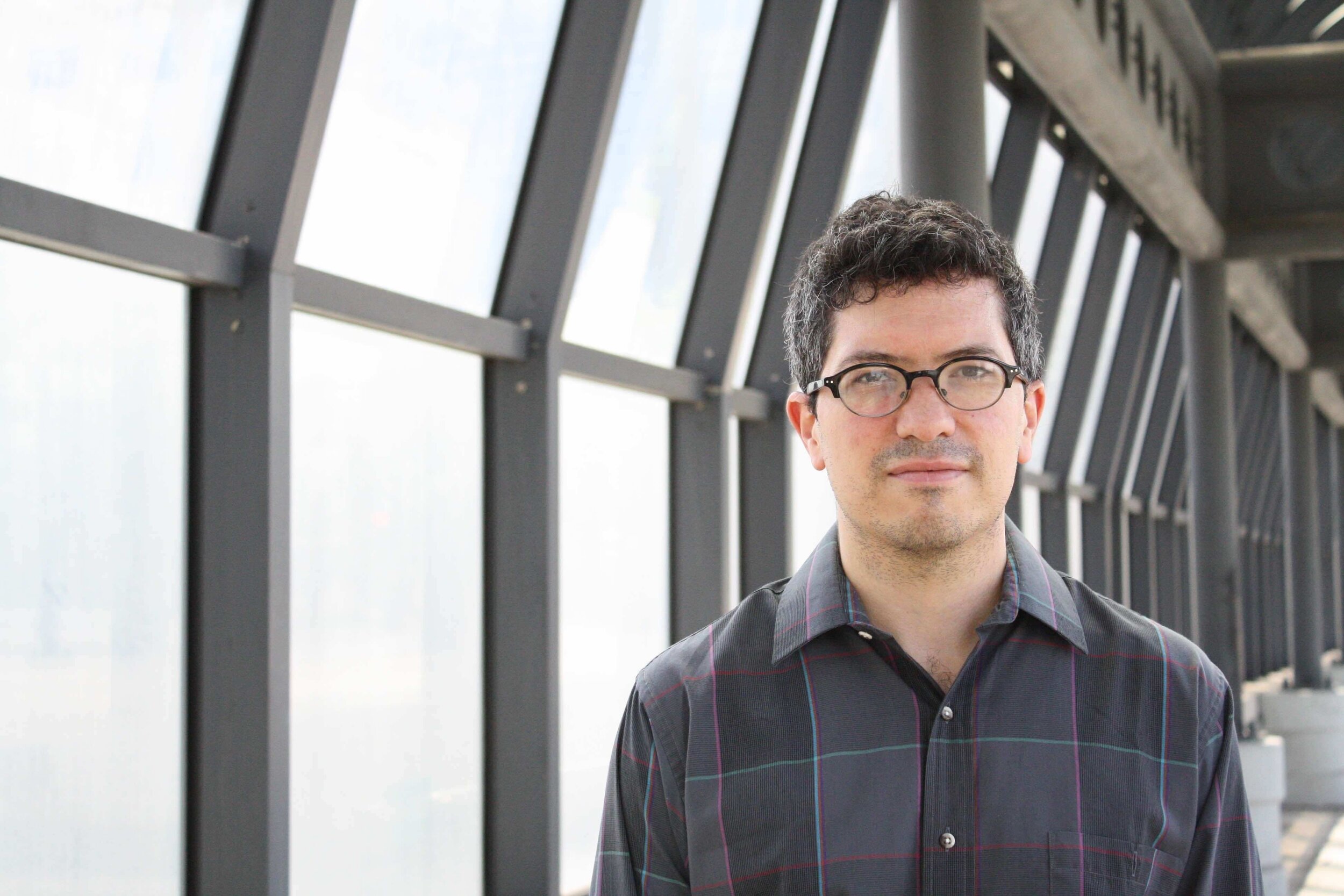 Engagement and Inclusion Senior Research Analyst/ACLS Public FellowI am now eight weeks into my new job in public media. The position is exactly as new to American Public Media Group as I am: Senior Research Analyst for Engagement and Inclusion (read more about it here). My general assignment is to develop a method for tracking the demographics of sources on which MPR News relies, and to help devise strategies for making news coverage and programming more distinct, diverse, and inclusive.The work will entail thinking about the broad range of experiences that inform perspectives. I’ll start with some of the things that influence the way I see the world: I am a cisgender straight male in my mid 30s. I am Latino, but I am also white. I don’t speak Spanish. I grew up Catholic, but I’m an atheist. And yet, “Catholic” remains part of my identity. I have a PhD in European history from the University of Illinois, Urbana-Champaign with an emphasis on German and Jewish history (I do speak German, and German Catholics were a part of my research). Politically, I’m liberal with a preference for the word progressive. Identity is complex, and while it can’t be reduced to a set of demographic information, the pieces help. Analyzing demographics is just one way I can help MPR News gain a better understanding of itself and its audiences.Before getting to that though I have to learn not just what journalists do, but how they do it. So for the past several weeks, I’ve attended daily news huddles, shadowed reporters, and gone into the studios to observe live radio production in action. I attended two tapings of Counter Stories, and I wrote a blog post about about one of them. I was continually reminded of the importance of language when it comes to matters of inclusion.Every industry and organization has its own vocabulary that makes sense to insiders but might sound strange to outsiders, and public media is no different. But words are more than just industrial quirks. Language can influence action.One of the first new words I learned was “vox.” I asked someone what it meant, and I learned that it was a news story reliant upon a reporter’s voice. I later learned that the shorthand was “vcr,” for the alternative “voicer.” Someone in the newsroom later sent me a “radio glossary” with more new words.One word excluded from the list, probably because it’s not a technical term like “voicer,” is “talker.” I always understood the term to mean long-winded, as in “They’re real talkers over there so clear your schedule.” And Seinfeld taught me, years ago, that people can also be “close talkers” and “low talkers.” In public media, people are often divided into “good talkers” and “bad talkers”—judgments regarding whether or not someone can authoritatively speak in clear and concise sentences in a manner that demonstrates investment in the topic, is easy to understand, and is pleasant to hear (at least, that’s a synthesis of what my colleagues have told me). It’s not that “bad talkers” never make it on the air, but they have to hold a powerful position to get there. A politician can be a bad talker and still get air-time. Given the medium of radio, there’s a clear rationale behind the good talker/bad talker dichotomy. Still, I’ve wondered if there isn’t something of a “talker tyranny” that filters out engaging and diverse guests and content. I don’t yet know the nature of it or how to get around it, but I’m thinking about it.I’m also thinking about how the meaning of words changes. Language evolves. I learned that lesson while writing a dissertation that parsed the meaning of terms like religion, confession, and race over the course of 60 years of German history as part of the process of defining who did and did not belong within the German national body, as well as who decided. Likewise, the definition of terms like diversity and inclusion continually are debated.Understanding and respecting the history and context of words and how they affect people differently is one way to combat microaggressions—words and actions that may unintentionally reinforce stereotypes but are no less exclusionary because of it. As I write this, MPR employees are participating in workshops about microaggressions and unconscious bias. These trainings should occur in every workplace, but they’re particularly necessary in an industry where the choice of words shapes public dialogue, influences attitudes, and drives behavior.What else it will it take for MPR News to be more relevant to more people, especially those often marginalized in media? How will the sound and language of public media need to change? For instance, what effect would replacing “good talker” with “inclusive talker” have on the voices and perspectives journalists choose to amplify? This is some of what I hope to learn in collaboration with my colleagues and the broader community.I’ll be posting here about this process, and I invite you to be part of it. Submit your thoughts, ideas and questions here or email them to emckinley@mpr.org
Engagement and Inclusion Senior Research Analyst/ACLS Public FellowI am now eight weeks into my new job in public media. The position is exactly as new to American Public Media Group as I am: Senior Research Analyst for Engagement and Inclusion (read more about it here). My general assignment is to develop a method for tracking the demographics of sources on which MPR News relies, and to help devise strategies for making news coverage and programming more distinct, diverse, and inclusive.The work will entail thinking about the broad range of experiences that inform perspectives. I’ll start with some of the things that influence the way I see the world: I am a cisgender straight male in my mid 30s. I am Latino, but I am also white. I don’t speak Spanish. I grew up Catholic, but I’m an atheist. And yet, “Catholic” remains part of my identity. I have a PhD in European history from the University of Illinois, Urbana-Champaign with an emphasis on German and Jewish history (I do speak German, and German Catholics were a part of my research). Politically, I’m liberal with a preference for the word progressive. Identity is complex, and while it can’t be reduced to a set of demographic information, the pieces help. Analyzing demographics is just one way I can help MPR News gain a better understanding of itself and its audiences.Before getting to that though I have to learn not just what journalists do, but how they do it. So for the past several weeks, I’ve attended daily news huddles, shadowed reporters, and gone into the studios to observe live radio production in action. I attended two tapings of Counter Stories, and I wrote a blog post about about one of them. I was continually reminded of the importance of language when it comes to matters of inclusion.Every industry and organization has its own vocabulary that makes sense to insiders but might sound strange to outsiders, and public media is no different. But words are more than just industrial quirks. Language can influence action.One of the first new words I learned was “vox.” I asked someone what it meant, and I learned that it was a news story reliant upon a reporter’s voice. I later learned that the shorthand was “vcr,” for the alternative “voicer.” Someone in the newsroom later sent me a “radio glossary” with more new words.One word excluded from the list, probably because it’s not a technical term like “voicer,” is “talker.” I always understood the term to mean long-winded, as in “They’re real talkers over there so clear your schedule.” And Seinfeld taught me, years ago, that people can also be “close talkers” and “low talkers.” In public media, people are often divided into “good talkers” and “bad talkers”—judgments regarding whether or not someone can authoritatively speak in clear and concise sentences in a manner that demonstrates investment in the topic, is easy to understand, and is pleasant to hear (at least, that’s a synthesis of what my colleagues have told me). It’s not that “bad talkers” never make it on the air, but they have to hold a powerful position to get there. A politician can be a bad talker and still get air-time. Given the medium of radio, there’s a clear rationale behind the good talker/bad talker dichotomy. Still, I’ve wondered if there isn’t something of a “talker tyranny” that filters out engaging and diverse guests and content. I don’t yet know the nature of it or how to get around it, but I’m thinking about it.I’m also thinking about how the meaning of words changes. Language evolves. I learned that lesson while writing a dissertation that parsed the meaning of terms like religion, confession, and race over the course of 60 years of German history as part of the process of defining who did and did not belong within the German national body, as well as who decided. Likewise, the definition of terms like diversity and inclusion continually are debated.Understanding and respecting the history and context of words and how they affect people differently is one way to combat microaggressions—words and actions that may unintentionally reinforce stereotypes but are no less exclusionary because of it. As I write this, MPR employees are participating in workshops about microaggressions and unconscious bias. These trainings should occur in every workplace, but they’re particularly necessary in an industry where the choice of words shapes public dialogue, influences attitudes, and drives behavior.What else it will it take for MPR News to be more relevant to more people, especially those often marginalized in media? How will the sound and language of public media need to change? For instance, what effect would replacing “good talker” with “inclusive talker” have on the voices and perspectives journalists choose to amplify? This is some of what I hope to learn in collaboration with my colleagues and the broader community.I’ll be posting here about this process, and I invite you to be part of it. Submit your thoughts, ideas and questions here or email them to emckinley@mpr.org
The CEO and the TSA: An Unlikely Moment of Gratitude
Here at APMG we're used to getting emails like this from our CEO Jon McTaggart. Those of us who've been around a while might even take them for granted. It's just part of the culture. But I'm reminded today that it's one of those things that makes us pretty unique... this culture of gratitude is demonstrated from the top-down, bottom-up, sideways, to-and-from our members, within and even beyond our communities. Read on to see what I mean: The email continues:He said, “I hear you a couple of times a year.” Could it be that he recognizes my name from my brief “thank you” messages after the MPR on-air Member drives?Then he said two of the nicest things I’ve ever heard from a TSA agent. “I’m a member,” he said. “Thank you for what you do.” He was thanking me! As he waived me through the check point, my heart swelled with pride. I gave him my best morning smile and said, “Thank you, so much, for listening and for your membership support!”There are nearly a million listeners to Minnesota Public Radio, more than 19 million listeners to our American Public Media programs, and even more when we add our digital and social services and live programs. This morning’s brief encounter is another proof point that…what we do really matters.I share the heartfelt gratitude of this TSA agent as a proxy for every listener and user whose lives we will touch today. Thank You for all your great work, today and every day.
The email continues:He said, “I hear you a couple of times a year.” Could it be that he recognizes my name from my brief “thank you” messages after the MPR on-air Member drives?Then he said two of the nicest things I’ve ever heard from a TSA agent. “I’m a member,” he said. “Thank you for what you do.” He was thanking me! As he waived me through the check point, my heart swelled with pride. I gave him my best morning smile and said, “Thank you, so much, for listening and for your membership support!”There are nearly a million listeners to Minnesota Public Radio, more than 19 million listeners to our American Public Media programs, and even more when we add our digital and social services and live programs. This morning’s brief encounter is another proof point that…what we do really matters.I share the heartfelt gratitude of this TSA agent as a proxy for every listener and user whose lives we will touch today. Thank You for all your great work, today and every day. more from the Inside APMG Blog
more from the Inside APMG Blog
Fellowship Highlight: Lila Cherneff
 submitted by Sarah EldredWith the release of the first few episodes of the podcast In The Dark last week, we want to be sure you meet the interns and fellows behind the scenes at APM Reports.Lila Cherneff is an APM Reports fellow. She joined APMG as a tape logger for American RadioWorks, which was new to her. “As a tape logger, I was instantly drawn into the fascinating raw tape coming through my headphones: from 23-year-old veterans describing their PTSD to aging physics professors' stories of trying to save school records from Hurricane Katrina. I was so impressed with the tone and breadth of the interviews; I knew I wanted to learn from the folks behind them."One of the components to radio production that Lila learned was research. “In my imagined notion of documentary radio, I thought you transition from interviews to writing to production in one seamless sort of magical creative sweep. It has been such a valuable learning experience for me to get to work with the APM Reports producers on all the tiny details and edits and revisions and re-revisions that go into producing an hour of damn good radio.”A few highlights from Cherneff's fellowship include tagging along on reporting trips to St. Paul Public Schools, the investigative workshop with Paul Myers from the BBC, and sitting in on tracking and mixing sessions. But where she feels she’s learned the most is, “getting to witness up close the day-in, day-out minutiae of a documentary radio program: how theory and data and deeply personal stories come together to create into a finished product.”Lila’s supervisor Ryan Katz, shared this about her,
submitted by Sarah EldredWith the release of the first few episodes of the podcast In The Dark last week, we want to be sure you meet the interns and fellows behind the scenes at APM Reports.Lila Cherneff is an APM Reports fellow. She joined APMG as a tape logger for American RadioWorks, which was new to her. “As a tape logger, I was instantly drawn into the fascinating raw tape coming through my headphones: from 23-year-old veterans describing their PTSD to aging physics professors' stories of trying to save school records from Hurricane Katrina. I was so impressed with the tone and breadth of the interviews; I knew I wanted to learn from the folks behind them."One of the components to radio production that Lila learned was research. “In my imagined notion of documentary radio, I thought you transition from interviews to writing to production in one seamless sort of magical creative sweep. It has been such a valuable learning experience for me to get to work with the APM Reports producers on all the tiny details and edits and revisions and re-revisions that go into producing an hour of damn good radio.”A few highlights from Cherneff's fellowship include tagging along on reporting trips to St. Paul Public Schools, the investigative workshop with Paul Myers from the BBC, and sitting in on tracking and mixing sessions. But where she feels she’s learned the most is, “getting to witness up close the day-in, day-out minutiae of a documentary radio program: how theory and data and deeply personal stories come together to create into a finished product.”Lila’s supervisor Ryan Katz, shared this about her,
Lila does not walk. She shuffles. She pads. She glides. And the way she glides is a function of her personality and the work she does. Lila seemingly effortlessly handles everything I throw at her…from the mundane to the more compelling parts of her job. One hour she’s filling out spreadsheets. The next she’s reporting at a local high school, conducting research or finding archival material vital to a documentary. Lila even made it into one of our documentaries this year talking as an expert on the lack of data on college education in prisons.
And she’s creative – Lila did a sketch for our documentary on remedial education which became the lead image for the website. (She also has an unhealthy obsession with Drake.)
Intern Highlight Two-For-One: Jackie Lawyer and Afua Paintsil
 submitted by Sarah EldredMinnesota Public Radio's 50th anniversary is right around the corner. Just a few months ago, Ali Lozoff was chosen to organize this benchmark year with celebrations, events and programs. Interns Jackie Lawyer and Afua Paintsil were hired to jump-start this enormous project.Jackie Lawyer is beginning her sophomore year at the University of Pennsylvania in just a few days. She applied for the internship because she “thought that the skills learned and practiced here would be applicable to an undertaking I have waiting for me when I head back to school.”“I'm learning a lot about the specifics of the archival process, which, before this internship, really only extended as far as the fact that fingerprints and pictures are not friends.” On a more serious note, “I've managed to absorb that way of holding one's self for when I actually exit my college student bubble and enter the real world. The project itself has allowed me to view the company's history in photos, and I can assure you the saying ‘a picture is worth a thousand words’ is definitely an average--some of them get your brain going and produce far more than a thousand words, and others just leave you with no words whatsoever.”
submitted by Sarah EldredMinnesota Public Radio's 50th anniversary is right around the corner. Just a few months ago, Ali Lozoff was chosen to organize this benchmark year with celebrations, events and programs. Interns Jackie Lawyer and Afua Paintsil were hired to jump-start this enormous project.Jackie Lawyer is beginning her sophomore year at the University of Pennsylvania in just a few days. She applied for the internship because she “thought that the skills learned and practiced here would be applicable to an undertaking I have waiting for me when I head back to school.”“I'm learning a lot about the specifics of the archival process, which, before this internship, really only extended as far as the fact that fingerprints and pictures are not friends.” On a more serious note, “I've managed to absorb that way of holding one's self for when I actually exit my college student bubble and enter the real world. The project itself has allowed me to view the company's history in photos, and I can assure you the saying ‘a picture is worth a thousand words’ is definitely an average--some of them get your brain going and produce far more than a thousand words, and others just leave you with no words whatsoever.”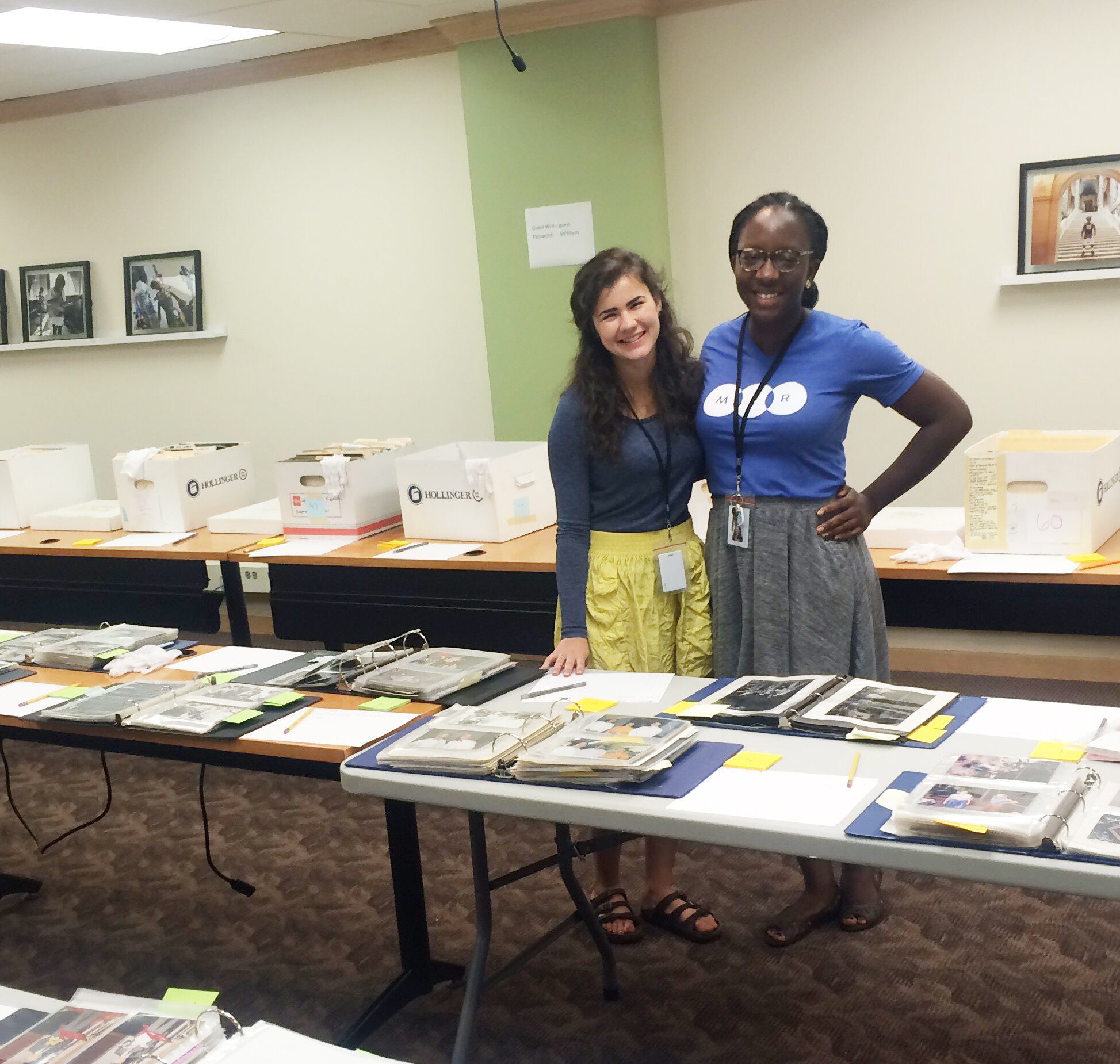 Just recently, Jackie and Afua showcased the culmination of their summer’s work. They oversaw a multi-day review of all the photos spanning 50 years which was open to the company to enjoy and comment. “Hearing all the stories behind all the pictures I've become so familiar with over the past month or so has been so much fun and I'm so glad to have helped create a space for people to relive the moments captured in these pictures,” said Lawyer.Paintsil had this to say about the photo review, “This past week has been very memorable just because I didn’t imagine our work would bring so much joy to employees. There was such a great energy in the room, everyone was just so happy to look through old photos or connect with people they don’t always see because they’re in different areas, it was like a class reunion.”Aside from the new skills she gained during the past few months, Afua treasured the time she had with Ali, “[she is] a great boss to have because she wants this to be more than an internship, but also a mentorship, so in the last few weeks she’s set up informational meetings for us and that’s been a great learning opportunity for me.”Both Lawyer and Paintsil had wonderful things to say about working with Margaret Bresnahan, Digital Media Coordinator in Broadcast Operations. Margaret agrees, “Jackie and Afua are whip smart and working with them has been a real treat. I look forward to the day they return to APMG to run the place as our COAs (Chief Officers of Awesome).”
Just recently, Jackie and Afua showcased the culmination of their summer’s work. They oversaw a multi-day review of all the photos spanning 50 years which was open to the company to enjoy and comment. “Hearing all the stories behind all the pictures I've become so familiar with over the past month or so has been so much fun and I'm so glad to have helped create a space for people to relive the moments captured in these pictures,” said Lawyer.Paintsil had this to say about the photo review, “This past week has been very memorable just because I didn’t imagine our work would bring so much joy to employees. There was such a great energy in the room, everyone was just so happy to look through old photos or connect with people they don’t always see because they’re in different areas, it was like a class reunion.”Aside from the new skills she gained during the past few months, Afua treasured the time she had with Ali, “[she is] a great boss to have because she wants this to be more than an internship, but also a mentorship, so in the last few weeks she’s set up informational meetings for us and that’s been a great learning opportunity for me.”Both Lawyer and Paintsil had wonderful things to say about working with Margaret Bresnahan, Digital Media Coordinator in Broadcast Operations. Margaret agrees, “Jackie and Afua are whip smart and working with them has been a real treat. I look forward to the day they return to APMG to run the place as our COAs (Chief Officers of Awesome).” At the suggestion of CEO Jon McTaggart, Lozoff was thrilled to have two interns rather than one, as originally planned. “[Jackie and Afua] were able to tackle the immense job of sorting through 50 years of documents and photographs to ready them for selection for the [commemorative] book. If they weren’t working together on the project, the task and being cooped up in the archives may have caused one of them to go a little stir crazy.”Interns are integral to APMG and so are great managers. Ali not only provided guidance in the archival process, but also designed additional learning opportunities. She explained: “Throughout the summer Jackie and Afua were able to work with and meet with a wide assortment of MPR staffers, affording them a glimpse into the working life of MPR. Since they are up close and personal with documents and images from the very founding days of the organization, it’s been great for them to see how this place functions day to day and has grown into what it is. Thanks to everyone who has taken time with them and explained how their individual roles contribute to MPR, and how they chose the career path they did.”And to reiterate the importance of being open to new experiences, Lozoff had this to say about her two interns, “As far as Jackie and Afua go – I couldn’t imagine selecting better candidates for this position. They are smart, self-sufficient, problem-solvers with positive attitudes and a curiosity about all things MPR. They’ve taken advantage of Slack channels, ticket offers, Church lunch, and social meet-ups to integrate themselves into #MPRLife in the short time they’ve been here. It’s been a delight. I only hope they are taking lessons from beyond the archives back to school with them.”more from the Inside APMG Blog
At the suggestion of CEO Jon McTaggart, Lozoff was thrilled to have two interns rather than one, as originally planned. “[Jackie and Afua] were able to tackle the immense job of sorting through 50 years of documents and photographs to ready them for selection for the [commemorative] book. If they weren’t working together on the project, the task and being cooped up in the archives may have caused one of them to go a little stir crazy.”Interns are integral to APMG and so are great managers. Ali not only provided guidance in the archival process, but also designed additional learning opportunities. She explained: “Throughout the summer Jackie and Afua were able to work with and meet with a wide assortment of MPR staffers, affording them a glimpse into the working life of MPR. Since they are up close and personal with documents and images from the very founding days of the organization, it’s been great for them to see how this place functions day to day and has grown into what it is. Thanks to everyone who has taken time with them and explained how their individual roles contribute to MPR, and how they chose the career path they did.”And to reiterate the importance of being open to new experiences, Lozoff had this to say about her two interns, “As far as Jackie and Afua go – I couldn’t imagine selecting better candidates for this position. They are smart, self-sufficient, problem-solvers with positive attitudes and a curiosity about all things MPR. They’ve taken advantage of Slack channels, ticket offers, Church lunch, and social meet-ups to integrate themselves into #MPRLife in the short time they’ve been here. It’s been a delight. I only hope they are taking lessons from beyond the archives back to school with them.”more from the Inside APMG Blog













